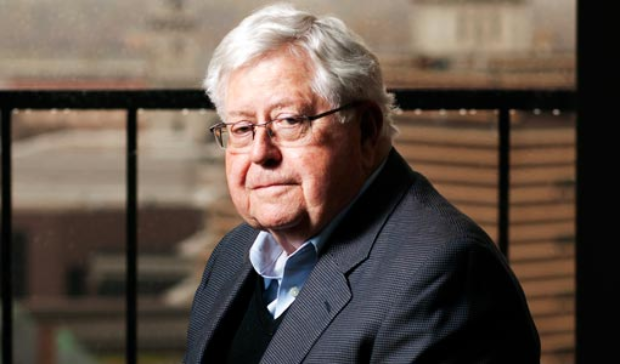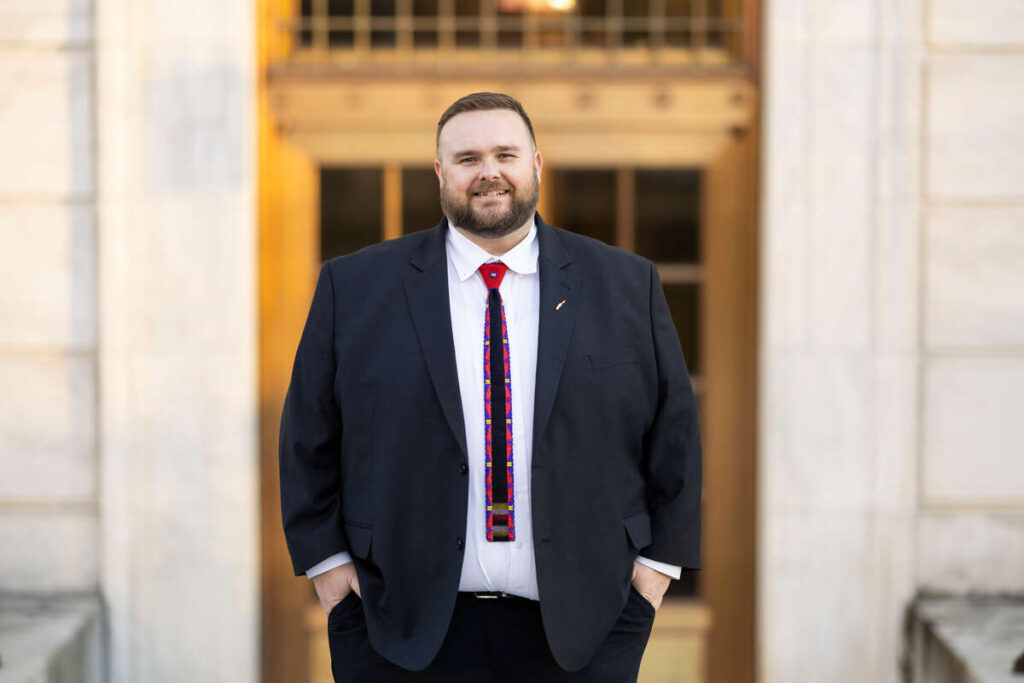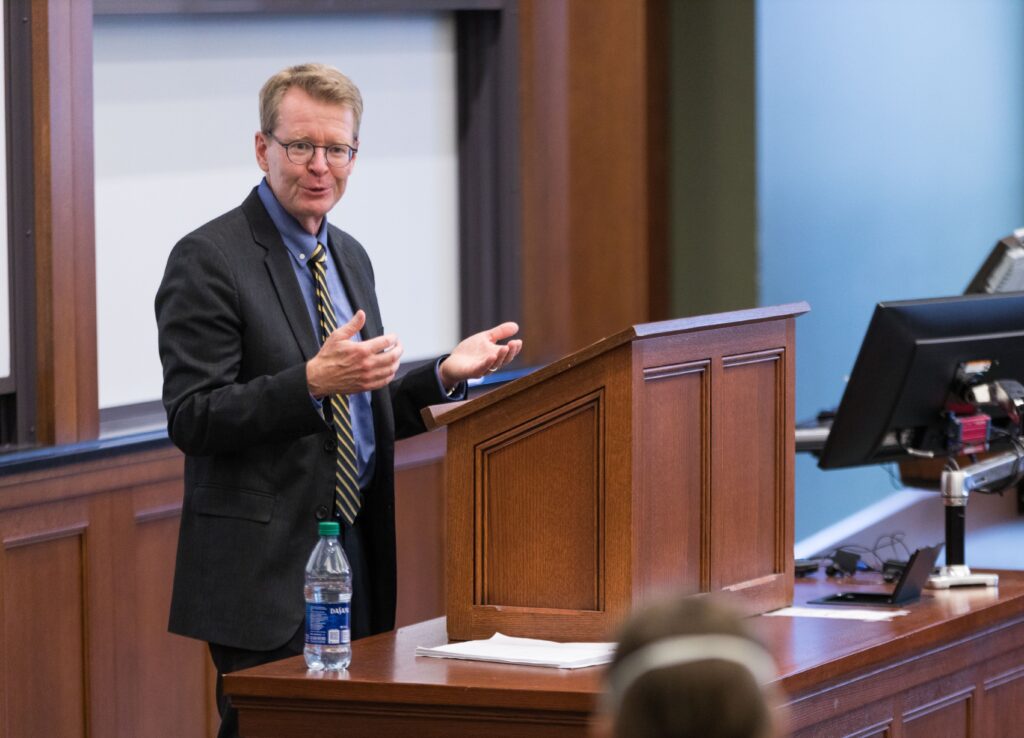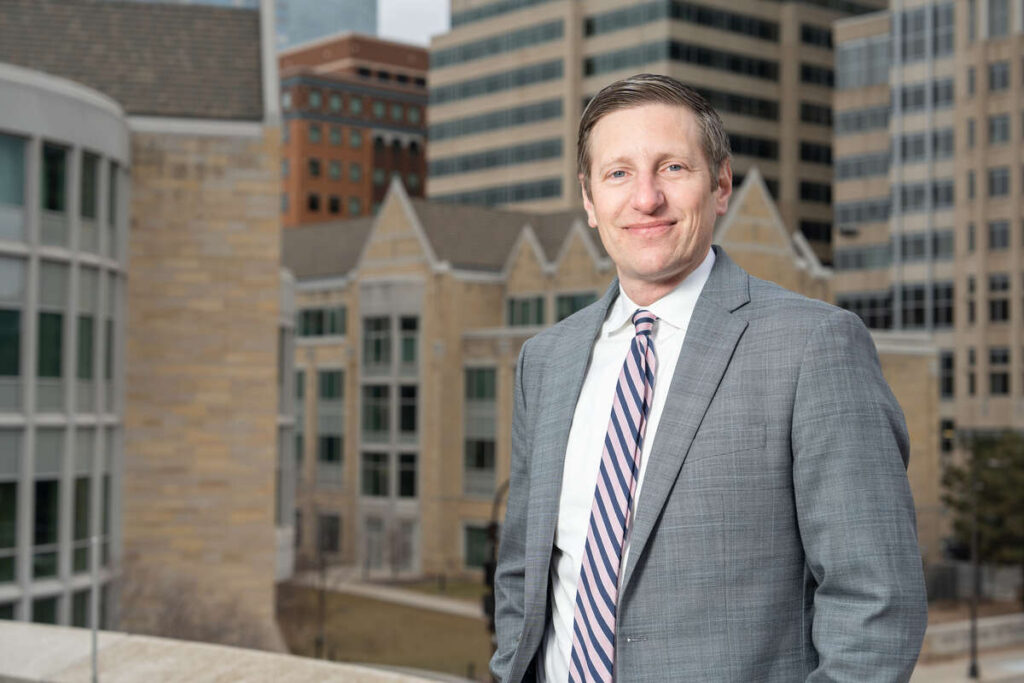There is an everyman quality about Thomas Holloran that masks his extraordinary life.
His office on the third floor of the law school is the one in the interior, without a window, in the center named in his honor – the Holloran Center for Ethical Leadership in the Professions. Behind him is an antique roll-top desk, mostly neat, but with small stacks of papers. In front of him is a small wooden table that came from an aunt’s house decades ago. There are few photos in the office other than those of his family. A photo of his wife, Patty, whom he calls his partner, sits on the corner of the table. A successful naval officer, lawyer, CEO and professor, Holloran has garnered awards, accolades and friends along the way, but remains unencumbered by the trappings of success. In talking with him and his close associates, there are lessons to be gained from studying the life of this extraordinary everyman.
By looking at five of his most notable characteristics – adventurousness, optimism, humility, gentleness and servant leadership – it’s easy to understand why he has been so successful in his endeavors.
Adventurousness
“I’ve never been a worrier. With God’s grace, my life has fallen into a pattern that I couldn’t have believed would happen,” Holloran said.
Whether serving on a ship in Korea, negotiating international deals in Brazil, teaching in Russia or traveling to the Holy Land, Holloran has taken on new challenges wherever they led him. His attitude is that you focus on what’s in front of you, and his ability to move from challenge to challenge with seeming ease has led to a string of adventures, more than most people have in a lifetime.
Born in 1929, Holloran grew up in South Minneapolis and went through the public school system, graduating from Washburn High School before enrolling at the University of Minnesota. He started in the law program, which at the time had a foundation of two years of undergraduate work and three more years required for a law degree. He also joined the U.S. Naval Reserve.
That decision led to Holloran’s first trip around the world. After four years at the U of M, with one year of law school left, he was commissioned in the Naval Reserve. Putting school on hold, he served for two years as a paymaster, and then was assigned to a destroyer on the East Coast as a supply officer. He sailed on the USS Sigourney from the East Coast to Korea, and then back to the United States through the Panama Canal.
“The Navy was a very maturing kind of experience,” Holloran said. He was commissioned at 21, on active duty at 22, and by 23 he was responsible for feeding 300 people three meals a day, paying them twice a month, and making sure they didn’t run out of supplies. “You had to plan ahead because only periodically you had access to supplies,” he noted.
After the Navy, Holloran returned to finish law school and clerked for Minnesota Supreme Court Justice Thomas Gallagher.
In 1954 he married his sweetheart, Patty, and he calls proposing to her “probably the most intelligent decision of my life.” After law school graduation in 1955, Holloran was hired by Wheeler and Fredrikson, the firm that would become Fredrikson and Byron. He became a partner at the firm after two years, built his practice in business and securities law, and developed his abilities in effective corporate governance.
In Holloran’s third year of practice at Wheeler and Fredrikson, he helped incorporate Medtronic, which at the time was a partnership of two, along with two employees, working out of a garage in Northeast Minneapolis. Little did he know that later he would become the company’s executive vice president, then president. His switch to Medtronic was just one professional move that showed his courage to take on new challenges.
Medtronic founder Earl Bakken considers Holloran a close friend. “I have more respect for him than almost anyone I know,” he said. He sums up the spirit with which Holloran took on each new challenge by calling him a great leader, and explaining that Holloran always advised that they act in moderation. He said the key to Holloran’s success at Medtronic was that “he learned the product well; he learned it expertly.”
Holloran’s natural ability to try new things was employed at Medtronic, where he had responsibilities that ranged from dealing with the federal Food and Drug Administration to helping work out manufacturing problems.
Holloran’s ability to seek new situations and fully commit to them also is noted by Charles Denny, former CEO and chair of ADC Telecommunications Inc.: “I thought that he had become, over time, the best of the professional directors. He studied that issue particularly as a director of Medtronic.”
After Medtronic, Holloran went on to lead investment banking company RBC Dain-Rauscher as chairman and CEO for 10 years.
“The one thing I love about Tom is his ability to take on a new career,” Denny said. He and Holloran crossed paths professionally several times, and Denny invited him to join the ADC Board of Directors. Denny remembers being tremendously impressed with Holloran’s business acumen and ability to be a productive board member. “The first thing one recognizes with any exposure to Tom is that he is an individual grounded in his own ethics,” he said.
After Dain-Rauscher Holloran dedicated himself to teaching new business leaders, becoming the management concentration director at the then College of St. Thomas in 1985.
Since 2002, he has been a senior distinguished fellow and professor at the University of St. Thomas School of Law, where he teaches and serves on the Board of Governors. He also played a role in the founding of the School of Law.
“The School of Law would not exist but for Tom Holloran,” said Federal District Judge Patrick Schiltz, a founding dean of the School of Law. “He was an informal adviser … and a member of the committee that studied the feasibility of opening the law school and made a recommendation to the Board of Trustees. He helped raise funds and win acceptance for the law school. … More than anything, Tom’s involvement gave the law school desperately needed credibility. Tom has tremendous respect among members ofthe St. Thomas community and members of the legal and business communities. Time and again, people said … ‘If Tom thinks this is a good idea, then I’m willing to give it a chance.’”
Optimism
Although many people have a positive outlook, Holloran exudes it. When he and Patty talk about their lives, they are thankful and believe that any paths would have been good.
“It’s only when you have the opportunity to look back over your life, that you may realize some of your greatest opportunities came because of adversity,” Holloran said.
He explained the delay of his last year of law school.
“I was profoundly disappointed,” Holloran said. “I wanted to finish school, get a job and marry Patty. And how much of my early law school courses would I remember when I finally took the bar? I have never regretted the opportunity and the obligation to serve my country, but the timing certainly could have been more opportune.”
After two years at sea, he returned, married Patty and finished law school.
“I went to work for a small firm – Fredrikson and Byron (as it is called today) as its fourth lawyer. Soon, I was working on the affairs of a variety of clients including the incorporation of Medtronic. After it grew, I went to Medtronic as its chief operating officer.
“So for me, bad news was good news,” he concluded. “Had I not had my two-year time out, none of this would have occurred.”
Holloran’s optimism also is demonstrated in his approach to people. Mary Edel Joyce, who recently retired from the Holloran Center, worked with him for 24 years. Holloran’s consistent optimism is what she remembers best from those years. “He always had a positive outlook. He has great concern for others. It really doesn’t matter who you are or what your position is, there is a fairness with Tom.”
Holloran seems to have an ability to motivate others to do their best work, and his positive attitude is apparent when looking back on previous challenges. Denny indicated there were significant challenges when Holloran moved into the CEO position of RBC Dain-Rauscher (formerly the Inter-Regional Financial Group Inc.) and credits Holloran with turning around the organization. Holloran, however, passes the credit to others: “There were an awful lot of good people there.”
Whatever the challenges, in each organization with which Holloran has been involved, the outcome was the same – a highly principled and successful establishment. Describing RBC Dain-Rauscher in those days, Denny said, “You could trust your wallet and your family to those guys.”
Humility
If you want to find out the scope of Holloran’s contribution to an organization, do not ask him. Instead, ask the people around him. Bakken and Holloran agree that the Medtronic founding mission statement is an outstanding document and adhering to it has been critical to the company’s success. What they don’t agree on is how important Holloran was to the document’s development.
According to Holloran, he provided some “wordsmithing,” but Bakken tells a different story. Bakken credits Holloran as one of the people who gave Medtronic its vision for being an ethical company, starting from his time as counsel and then as a member of the board. “The mission statement is 50 years old, and it is as valuable as when it was written,” Bakken said. Neil Hamilton, law professor and director of the Holloran Center for Ethical Leadership, adds that at the time, the financial pressure on Medtronic was mounting, yet Holloran held to the ideals that led the company through those challengesand continue to lead it today.
One of the things that goes unnoticed about Holloran is the sheer number of lives he has affected. Bakken mentions the deep friendship that he and Holloran have maintained over the years, which came out of their time at Medtronic but has been solidified as Bakken has guest lectured in Holloran’s classes and they have spent time together socially.
Many people mention Holloran as their first connection to the University of St. Thomas. Beyond that, thousands of students have been influenced by Holloran. Between courses in the Opus College of Business and the School of Law, he has challenged students to think about the role that ethics will play in their professional lives.
According to Ken Goodpaster, the David and Barbara Koch Endowed Chair in Business, Holloran doesn’t receive credit for all of the things in which he is an expert. “He has a voracious appetite for news and publications,” Goodpaster said. He and Holloran have joked about Holloran’s “unnatural relationship with the copy machine,” because he is constantly copying articles. For Goodpaster, this indicates not only Holloran’s tremendous intellectual curiosity but also his concern for others by sending the copies to colleagues or friends who can use the information. His interests are not limited to law and business but are expansive, including his significant scholarship in Minnesota history.
Gentleness
When thinking about success in American business, law, education and public service, few people think of gentleness as a key quality, but those close to Holloran all use that word to describe his approach to life and people.
Asked about why people describe him as gentle, Holloran simply says, “I’ve never been one who can motivate people by giving orders.” In further discussion, Holloran said his goal is to help others in a way that lets them shine.
Edel Joyce said, “He makes everyone feel comfortable. He has a passion for trying to help people, for trying to guide people, and I’m not even sure he is aware of how he has influenced people.” She saw it first hand as he dealt with students, colleagues and board members.
Edel Joyce started at St. Thomas’ graduate school of business, working with Holloran in 1985 in a house on Grand Avenue. She described it as a wonderful place to work. At that time, Holloran was the management concentration director. When the graduate programs in business moved to Minneapolis, Edel Joyce and Holloran moved together. “I don’t think in my lifetime I will meet someone else like him,” Edel Joyce said. “He is one of the people who made me want to stay at St. Thomas.”
Edel Joyce managed Holloran’s busy academic work schedule and helped set appointments for the many boards on which he served. They developed a strong partnership. One day, after he had left the office, she discovered he was headed to the wrong side of the Twin Cities for a meeting. In the days before cell phones, she quickly called Bruegger’s Bagels on Grand Avenue to tell him he was in the wrong city for the meeting. Sure enough, she caught him. “The joke was that I knew where he was without him telling me,” she said. The more important thing that has stuck with Edel Joyce over the years is that he never got upset or flustered. He just moved on.
One of the reasons Holloran may be credited with gentleness is his amazing ability to listen. “I’ve spoken to him dozens of times about issues, and I’ve always been struck with how well he listens,” said Tom Mengler, School of Law dean and Ryan Chair in Law. “He exudes integrity, honesty and transparency.”
Goodpaster added, “He has the capacity to engender trust in those who encounter him, and that is an amazing virtue. It is essential for leadership.” According to Goodpaster, Holloran has a way of talking respectfully about people who are not in his presence. “It is a very powerful trait, and I have seen it at work and I have seen it at the lunch table in the faculty dining room.
“People trust Tom because he gives them examples over and over of being trustworthy. When people are looking for leadership they are going to gravitate toward Tom because he has their interests at heart.” Goodpaster believes that Holloran is a model of what a faculty member should be. “He doesn’t have to give speeches about virtue, he just lives it, and people notice it.”
Servant Leadership
Holloran’s life of service is easily demonstrated through even a partial list of organizations that he has helped guide. He was a board member of the University of St. Thomas from 1979 to 1989, and was formerly the president of the Alumni Association of the University of Minnesota, a former trustee of the University of Minnesota Foundation and a board member of the College of St. Scholastica.
He served on other nonprofit boards, including the Archdiocese of St. Paul and Minneapolis, the Center for Ethical Corporate Cultures, the Minneapolis Institute of Art, the Walker Art Center, the Bush Foundation and the St. Paul Seminary. Holloran also served for three years as mayor of Shorewood, where he and his family lived, on the Metropolitan Airports Commission for 10 years and as a municipal judge for South Minnetonka for more than four years.
He received the Community Award for Outstanding Service on Boards of Directors from Twin Cities Business Magazine in 1996, and its Lifetime Achievement Award in 2002. The University of St. Thomas School of Law has given two awards to Holloran: its Iustitia et Lex Award in 2009 and its Knowledge Creation and Societal Award in 2004.
Holloran’s commitment to service always has been in areas that he cares deeply about. He continues to work with the National Association of Corporate Directors, an organization that works on issues of corporate governance – a longtime interest for Holloran. John Stout, who worked andtaught with Holloran on issues of corporate governance, says that the work of NACD is not glamorous, nor is it an organization that is likely to make the news; however, this is the type of organization that Stout said demonstrates Holloran’s commitment. According to Stout, Holloran is willing to give his time and talents generously, and when he gets involved in a project, he is fully engaged.
A Continuing Legacy
Among the many people who attribute to Holloran at least part of the reason why they are at St. Thomas is Henry “Hank” Shea, the former Assistant U.S. Attorney who is a senior distinguished fellow at the Holloran Center and a law professor. “The thing that stands out is Tom’s role-model status,” Shea said. “He is a role model in terms of integrity, dedication to excellence and his warm embrace of people.” Shea sums up what many think when they look at Holloran’s life: “It is a challenge to all the rest of us to follow in just some of his footsteps.”
Stout is another person who is in Minnesota partly because of Holloran. Recruited to Fredrikson and Byron by Holloran, Stout still remembers the day nearly 50 years ago when Holloran told him he was going to Medtronic. He knew he was going to miss working with Holloran, but one of the amazing parts of Holloran’s legacy is his ability to maintain connections with people. Over the years Holloran and Stout remained friends as they worked together and shared an interest in corporate governance. Having seen Holloran in all stages of his career, Stout sums up the legacy in a way similar to many others, “He would be anyone’s definition of a servant leader.”
In 2007, the School of Law and the Opus College of Business established the Thomas E. Holloran Center for Ethical Leadership in the Professions to encourage leaders to serve others, and nurture community values and integrity. It is aptly named in honor of the man who sits in its inner office hard at work on his next project.
Read more from St. Thomas Lawyer.





